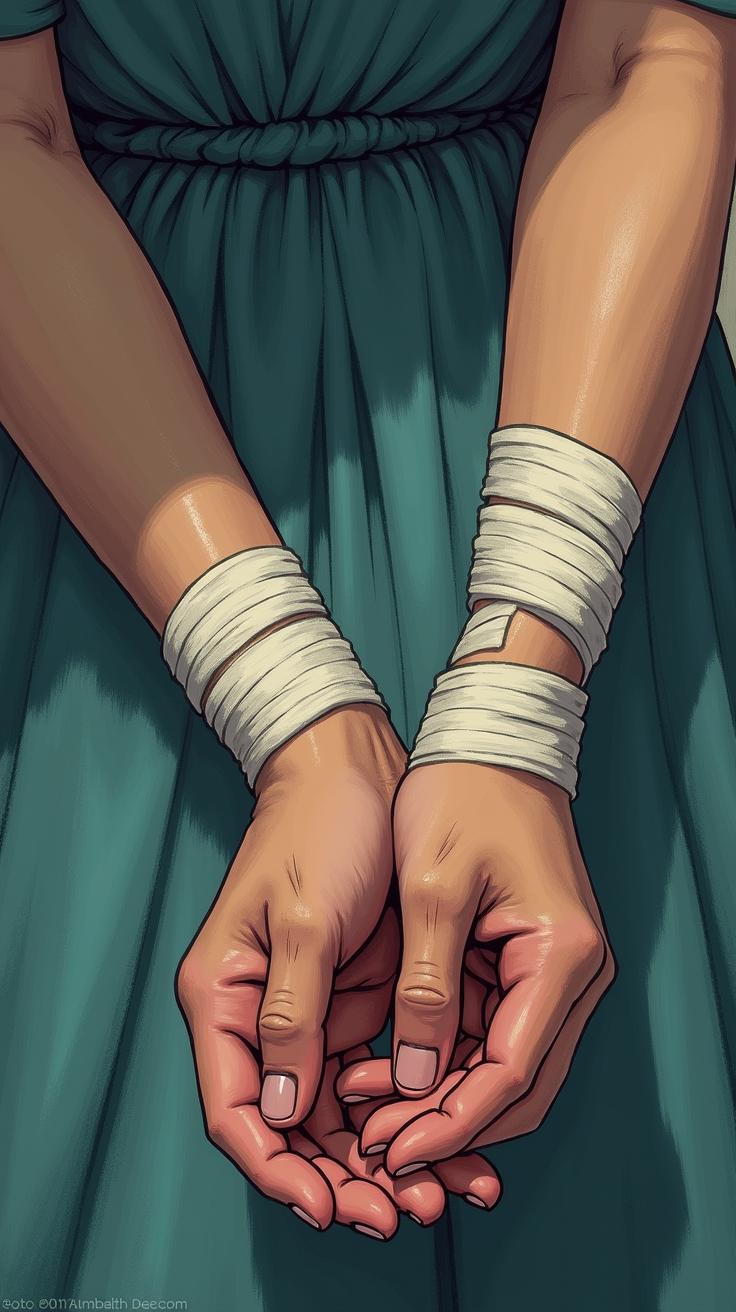AITA for avoiding my mom after she told me to “suck it up” when I broke my fingers
 Image credit: Pixabay (This is example image – Not the actual photo)
Image credit: Pixabay (This is example image – Not the actual photo)
When Pain Meets Indifference: A College Student’s Dilemma
After a heavy weight crushes her fingers at the gym, a college student reaches out to her unsympathetic mother for help, only to be met with harsh dismissal. Torn between her mother’s tough love and her own need for care, she faces a painful decision about seeking medical attention. When the X-ray reveals broken fingers, the student grapples with her mother’s sudden interest in her well-being, leaving her questioning their relationship. This story resonates with anyone who has navigated the complexities of family dynamics and the struggle for validation in times of crisis.
Family Drama Over Injury: A Conflict Resolution Dilemma
In a recent incident, a college student experienced a painful injury while at the gym, leading to a complicated family dynamic with their mother. Here’s a breakdown of the situation:
- Injury Incident: The student suffered a heavy weight falling on their left hand, resulting in severe pain and swelling in three fingers.
- Seeking Help: In distress, the student called their mother for support, expressing concern about a possible fracture and the need for urgent care.
- Lack of Empathy: The mother, known for her lack of empathy regarding physical injuries and mental health, dismissed the student’s concerns, advising them to “suck it up.”
- Waiting Game: Unsure of the severity of the injury, the student decided to wait, hoping the pain would subside.
- Roommate’s Intervention: Upon returning home, the student’s roommate noticed the condition of the hand and insisted on going to urgent care.
- Financial Concerns: The student hesitated due to their mother’s warnings about their insurance but researched the out-of-pocket cost for an X-ray, which was manageable.
- Mother’s Reaction: After informing the mother about the urgent care visit, she coldly remarked that the student should hope for a fracture to justify the expense.
- Diagnosis: The X-ray confirmed that both the pointer and middle fingers were broken, with potential surgery needed for proper healing.
- Communication Breakdown: After sharing the diagnosis with the mother, she laughed and suggested the student should be glad about the injury, leading to a three-week silence between them.
- Conflicted Feelings: The student is now uncertain about how to respond to their mother’s recent texts asking for updates, questioning her sudden interest in their well-being.
- Advice from Sibling: The student’s brother suggested that the mother may genuinely want to check in, but the student feels conflicted about her previous lack of support.
This situation highlights the complexities of family drama and the challenges of conflict resolution. The student is left pondering whether to address the emotional disconnect with their mother or to maintain distance given the past interactions. Navigating this relationship may require careful consideration of feelings and communication styles.
This is Original story from Reddit
 Image credit: Pixabay (This is example image – Not the actual photo)
Image credit: Pixabay (This is example image – Not the actual photo)
My Gym Injury
I was at the gym when a heavy weight fell onto three of the fingers on my left hand. I was in such severe pain that I thought I was going to pass out. While sobbing, I called my mom as I was at college, far away from home.
I told her that I thought I broke my fingers and that I wanted to go to urgent care. My mom has never been empathetic toward physical injuries and mental health issues. When she heard me, she told me to suck it up and rest.
I figured I would wait for a while; who knows, she could be right. I feel I should mention that my fingers did not look deformed, so other than the bruising and swelling, I was unsure if they were broken or not.
While waiting, my roommate came home and saw the state that I was in. She took one look at my hand and assured me we had to go to urgent care. I didn’t want to betray my mom because she always said to never go to the ER or urgent care due to our “terrible insurance.”
However, I went and researched the cost of an out-of-pocket X-ray at the nearest urgent care, and it was only $200, which I was willing to pay. I told my mom this, and she said, “You better hope your fingers are broken or else I’m not helping you pay for anything.” So I was under a weird circumstance where I hoped my fingers were broken for the sake of saying “I told you so” to my mom.
I finally went to urgent care and got an X-ray. They confirmed both my pointer and middle fingers were broken and may need surgery if not healed properly. When I called my mom back later that day and told her the news, she basically laughed and told me I should be glad that they were broken.
Three weeks have gone by, and I have not spoken to her since. She’s texted me and asked for updates on my fingers, but I feel conflicted about why she’s suddenly acting like she cares when she clearly didn’t in the first place. She’s also not someone you can easily share your feelings with, so I’m not sure how to go about our next conversation.
Should I just ignore it, or try to bring it up with her? I was not expecting the overflow of “NTA” comments, and I have been asked about why I believe I am the asshole. I spoke to my brother about it, and he told me that I was overreacting and that she just wants to check up on me and probably feels bad for diminishing my issues.
View the Original Reddit Post Here
Summary of Reddit Comments
The top Reddit comments indicate a strong consensus that the original poster (OP) is not at fault (NTA) for seeking medical help independently from their mother, who is perceived as controlling and possibly narcissistic. Many users emphasize the importance of establishing boundaries and suggest that OP should prioritize their own health and well-being over their mother’s opinions, while also recognizing the complexities of their relationship. There is a shared understanding that OP should focus on becoming financially independent to gain more control over their life.
Verdict: NTA
Expert Advice for Resolving the Conflict
Conflict within family dynamics can be challenging, especially when it involves health and emotional support. Here are some practical steps for both the student and the mother to consider in resolving their conflict:
For the Student
- Reflect on Your Feelings: Take some time to understand your emotions regarding your mother’s reactions. Acknowledge your hurt and frustration, but also consider what you want from this relationship moving forward.
- Set Boundaries: Clearly define what behaviors you will accept from your mother. Communicate these boundaries respectfully, emphasizing that your health and well-being are priorities.
- Communicate Openly: When you feel ready, reach out to your mother. Share your feelings about her lack of support during your injury. Use “I” statements to express how her comments affected you, such as “I felt dismissed when you said to ‘suck it up’.” This can help reduce defensiveness.
- Seek Support: Consider talking to a therapist or counselor who can help you navigate your feelings and develop coping strategies for dealing with your mother’s behavior.
- Focus on Independence: Continue working towards financial and emotional independence. This will empower you to make decisions that prioritize your health without feeling beholden to your mother’s opinions.
For the Mother
- Practice Empathy: Reflect on your responses to your child’s injury. Consider how your words may have impacted them emotionally. Try to understand their perspective and the importance of emotional support during difficult times.
- Open the Dialogue: Reach out to your child and express a desire to understand their experience better. Acknowledge the silence and your previous comments, and be open to listening without being defensive.
- Educate Yourself: Learn about the importance of emotional support in family relationships. Understanding the impact of injuries, both physical and emotional, can help you respond more compassionately in the future.
- Be Willing to Change: If your child expresses a need for more support, be open to adjusting your behavior. This may involve being more present and validating their feelings, even if you don’t fully understand them.
- Consider Professional Help: If you find it difficult to communicate effectively with your child, consider family therapy. A neutral third party can facilitate healthier communication and help rebuild trust.
Ultimately, both parties should strive for understanding and compassion. Healing the relationship may take time, but with open communication and a willingness to change, it is possible to move forward positively.
Join the Discussion
 Image credit: Pixabay (This is example image – Not the actual photo)
Image credit: Pixabay (This is example image – Not the actual photo)
What do you think? Would you have handled this differently?
Share your thoughts below! Vote: Do you agree with Reddit’s verdict?










